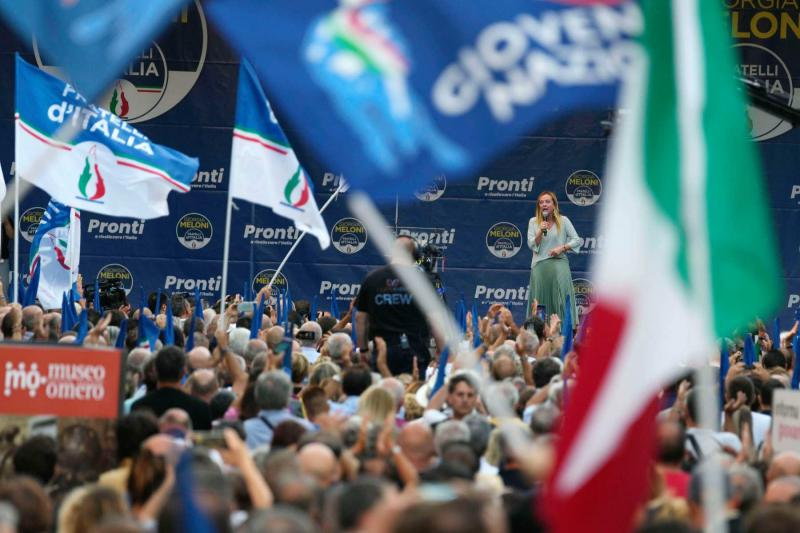Italy’s far-right government's impact to be felt abroad
The victory of Giorgia Meloni in the Italian election has left journalists searching for adjectives. Is the political party of her Brothers of Italy fascist? (It undoubtedly shares a logo with a group started by Mussolini's lieutenants.) Is it populist, far-right, or neo-fascist?
The ambiguity surrounding Meloni, who has occasionally adopted a more conciliatory tone and promised to rule for all Italians after her triumph, reflects this confusion.
And it is most strongly represented in the more general inquiries that must now be made regarding the fourth-largest economy in Europe: What does it mean for an openly far-right party to triumph in Europe in the twenty-first century?
Just over 100 years have passed since Benito Mussolini founded his fascist political organization. The invasion of Ukraine, which the leader of NATO has dubbed the most perilous time for Europe since World War II, and deteriorating economic conditions coincided with Meloni's triumph. Journalists who analyze the historical hints cannot but notice similarities.
It's odd that not many of these inquiries concern Italy
specifically. Instead, they discuss the bigger picture of how the electoral
triumph came about. That is true for a good reason. The far-right government in
Italy won't have an immediate impact on the nation itself, but it will have an
impact on the rest of Europe and the Middle East.
One reason is that the Brothers of Italy's success gives the story its own narrative drive. After Marine Le Pen finished second in the French presidential race and the Sweden Democrats rose to the second-largest party two weeks ago, this is the third time in the past six months that a far-right political party has come dangerously close to holding real power in Europe.
The far-ideologies rights are influencing European politics. Every major European nation's national debate now includes discussions about social conservatism, immigration difficulties, the repercussions of Russia's war in Ukraine, and the rising cost of living.
Although Italy has unique characteristics, particularly with regard to the declining birthrate and significant youth unemployment, the problems Meloni highlighted in her election campaign are prevalent throughout the rest of Europe. As a result, contenders on the far right will also be looking to her victory for ideas or strategies they may use in their own nations. That is already the case, according to far-right French agitator Eric Zemmour, who said that Meloni's plan to offer a unified far-right slate for the elections might also succeed in France. That poses a serious threat, especially in light of how close Le Pen came in April.
not just the extreme right. Across the continent, candidates who identify as mainstream conservatives have attempted to "take the clothing" of the far-right and adopt and mainstream their principles. Other conservatives could emulate Meloni's professed conservatism and fondness for the nuclear family. Although the emphasis on law and order has long been a conservative cornerstone, it has the added power of being linked to immigration and the wars across the Mediterranean, which drive it, in Italy and other southern European nations.
All of which implies that the problems that helped Meloni and her alliance gain control of the continent still exist elsewhere, and corresponding parties will be keen to present comparable answers.
The external factors that contributed most to Meloni's ascent to power occurred on the southern side of the European Union, therefore this is especially true there.
The majority of boat arrivals for migrants simply land in Italy, Greece, or Spain at the southern border of the European Union.
Despite the fact that migration is ostensibly an EU-wide issue, the Dublin Agreement of 2013 stipulates that the country that receives asylum applicants first is obligated to handle and process them. As a result, the southern Mediterranean nations have unavoidably been under a great deal of pressure and have been forced to try a variety of methods to halt the flow of migrants.
Matteo Salvini, the leader of the far-right League party, would likely reinstate his divisive "closed ports" policy from 2018, which barred vessels that had saved migrants at sea from entering Italian ports if he were to win the interior minister position, which he currently holds.
That sparked a furore of outrage in Italy and around Europe, but it also had repercussions in North Africa. As smugglers look for alternate routes or the government seeks separate agreements with nations like Libya to prohibit the boats from crossing and crack down on smugglers, this will be the second location where the effect is felt.
However, it is a strong domestic issue. Due to the high migrant population in these areas, the right-wing vote is heavily concentrated in northern Italian districts. Many people who arrive in Italy prefer to travel north to countries with stronger economies and more "grey market" jobs, such as France, the UK, or Germany. This implies that as they look for a method to cross the border, the migrants gather in northern Italy.
EU nations have discussed amending the Dublin Agreement and
enforcing quotas throughout the union, but northern European nations have taken
their time, content to put off the matter until after the next election or
under a new administration.


Comments
Post a Comment